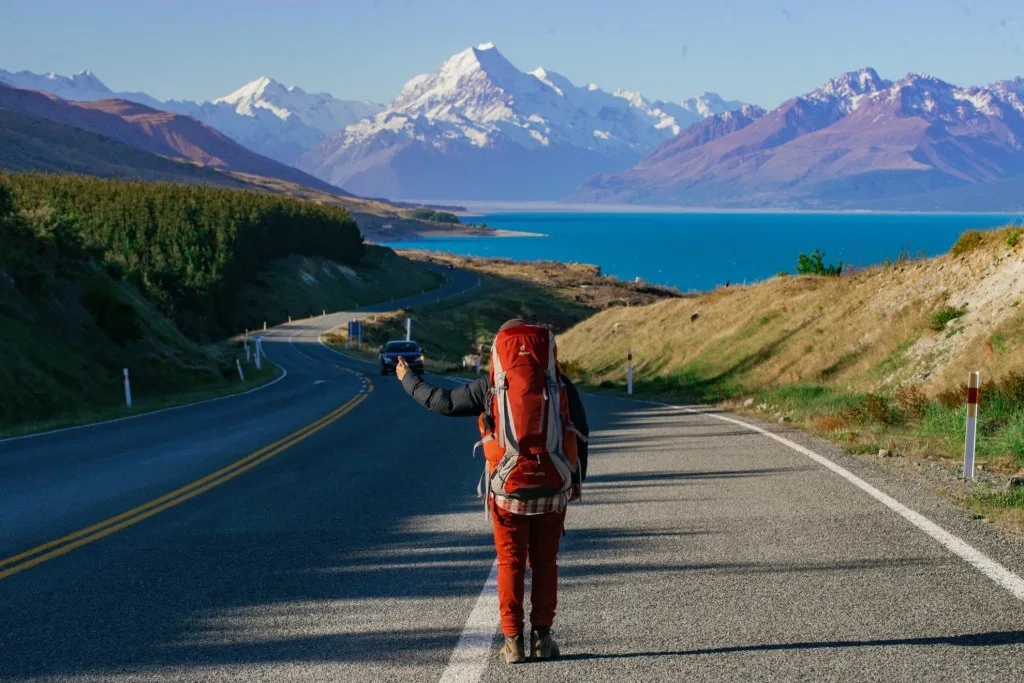Once upon a time, a common way for many folks to get around America was to hitchhike.
Sometimes it was a necessity, and sometimes it was to explore the country.
But how often do everyday people hitchhike these days? And is it even legal?
Let’s find out!
What is Hitchhiking?
Hitchhiking is the act of traveling by getting rides from passing drivers. The hitcher stands on the side of the road, facing traffic, thumb out in the direction they’re heading.
Usually, the driver gives the hitcher a free ride, telling the hitchhiker the drop-off point. It’s easy to imagine why truck drivers have a reputation for providing plenty of rides.
Hitchhiking was most common in the United States after the Great Depression in the 30s and 40s. At the time, it was a necessity to some. Its popularity waned in the 50s but swooped back up in the late 60s and 70s.
Hitchhiking became part of the youth culture of exploration and freedom. By the mid-80s, the fad waned again due to the culture shift to individualism and fear of stranger danger.
Seeing a hitcher is more common today in countries like Poland and the Netherlands. Government vehicles are mandated to pick up hitchers in Cuba.
Although the practice hasn’t completely vanished, it’s not something you’ll commonly see these days in the US. Perhaps if you stay in a European youth hostel and ask around, you’ll find some experts.

Is It Legal to Hitchhike in the USA?
In 44 of 50 States, yes. However, it’s illegal to hitchhike in Nevada, New Jersey, New York, Pennsylvania, Utah, and Wyoming. In all other states, you just need to be mindful of the rules.
Generally, you need to stay on the shoulder or sidewalks. It’s illegal to stand in the roadway in every state.
Whether or not an officer stops you is another story. Most hitchhikers will get a warning if they’re in a state where it’s illegal. Some states, such as Nevada, treat hitchers well even though it’s not legal there. The bottom line is that police officers just want you to be safe.
Why Hitchhike?
Despite the declining popularity, plenty of people still love hitchhiking and claim there are many things to be gained from the practice. Cult filmmaker John Waters hitchhiked from Baltimore to San Francisco for his 2014 book, Carsick.
Aside from the most apparent bonus – it’s free – hitchhiking is a great way to experience freedom. This is a statement many a hitcher will tell you. Some hitchhikers feel a sense of liberty and an expanded sense of possibilities. Trusting strangers can be a great confidence booster.
In addition, hitchhiking is an excellent way to meet people. Getting a ride from a local in an unknown area can be a fun way to make things feel less foreign. A small road trip gives you an opportunity for unique conversations and a more memorable adventure.
That said, it’s imperative to keep your wits about you. And to be gracious. Staying positive and avoiding disagreements is always a good practice. It’s incredible how far a good conversation can go.

Is It Dangerous to Hitchhike?
Studies show that hitchhikers are not disproportionately more likely to be victims of crime. This may seem hard to believe.
We’ve all heard stories of people being picked up on the side of the road by serial killers. Many of us have seen horror movies like The Hitcher and The Texas Chainsaw Massacre. Both involve a bummed ride and some seriously bad luck.
But the reality about hitchhiking is that most people who do it don’t get harmed. Most abductions are committed by people who know their victims. Robberies and other crimes happen just as much in local, familiar settings.
Some tips on making a hitchhiking adventure safer include choosing your ride carefully or getting out if you’re just not jiving. This is perfectly acceptable road etiquette. You may want to dress in bright colors and clean clothes. Choose a spot where drivers can see you, but off the road, and where it will be easy for a car to pull over safely.
Aside from that, remember what’s in the word: hiking. You are still on a hike, even when hopping from car to car. Pack food, water, and juice up on your phone. In fact, bring a booster if you can!
Pro Tip: Traveling on your own? Find out Is Solo Camping Safe?

Is There a Hitchhiking App?
Yes, and not really.
My Hitchhiking Spots is an app created by folks who love to hitchhike. They maintain a website called Hitchwiki, where you can look up info, join a chat, or subscribe to a mailing list. The app creates records of where you hitch and shows where other folks have had luck in the past.
Be aware that Hitchhiker is an app connecting travelers with people who need something transported from point A to B. For example, the person gets paid to get on a plane and bring a fancy pair of jeans from Boston to Cairo. It’s not meant for those on the road looking for a good samaritan to give them a ride.
One good option is to join a Facebook group for hitchhikers. NOMADS – Hitchhiking Club has a robust membership and might be a good place for anyone in the US to learn more. Hitchhiking Europe is another great Facebook group. Reddit Hitchhiking is another option.
Pro Tip: After hitchhiking to where you want to explore, use these 5 Best Hiking Apps for Finding Hiking Trails.
Is Hitchhiking Worth It?
The answer to whether hitchhiking is worth it or not is 100% personal. We can’t advise you on that either way. But we can help you weigh the pros and cons.
If you decide to go, be safe and be prepared. Remember – it’s a hike. Basic protocols like staying alert, hydrated, and maintaining a positive outlook are essential.
Have you ever hitchhiked? How was your experience?
Discover the Best Free Camping Across the USA
To be honest with you, we hate paying for camping. There are so many free campsites in America (with complete privacy).
You should give it a try!
As a matter of fact, these free campsites are yours. Every time you pay federal taxes, you’re contributing to these lands.
Become a FREE CAMPING INSIDER and join the 100,000 campers who love to score the best site!
We’ll send you the 50 Best Free Campsites in the USA (one per state). Access the list by submitting your email below:
[…] to Drivin Vibin it is illegal in Wyoming, Utah, Pennsylvania, Nevada, New Jersey and in New York State. When […]